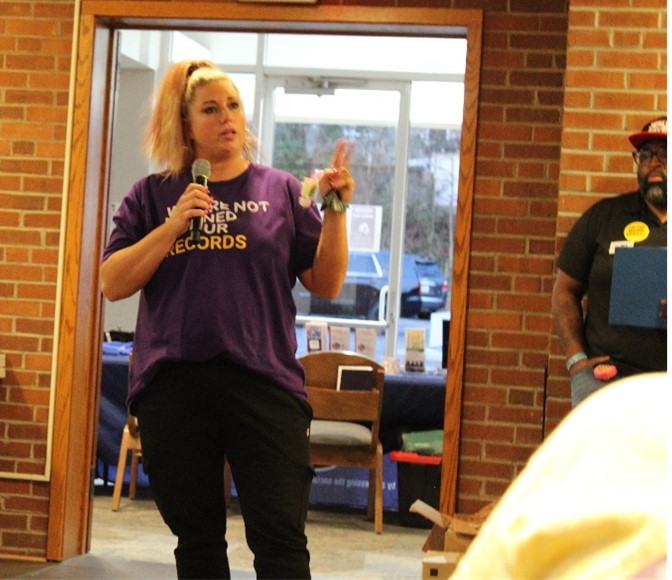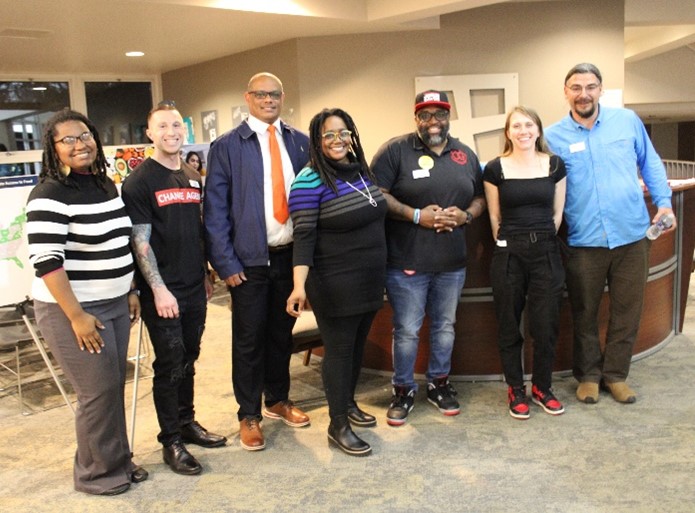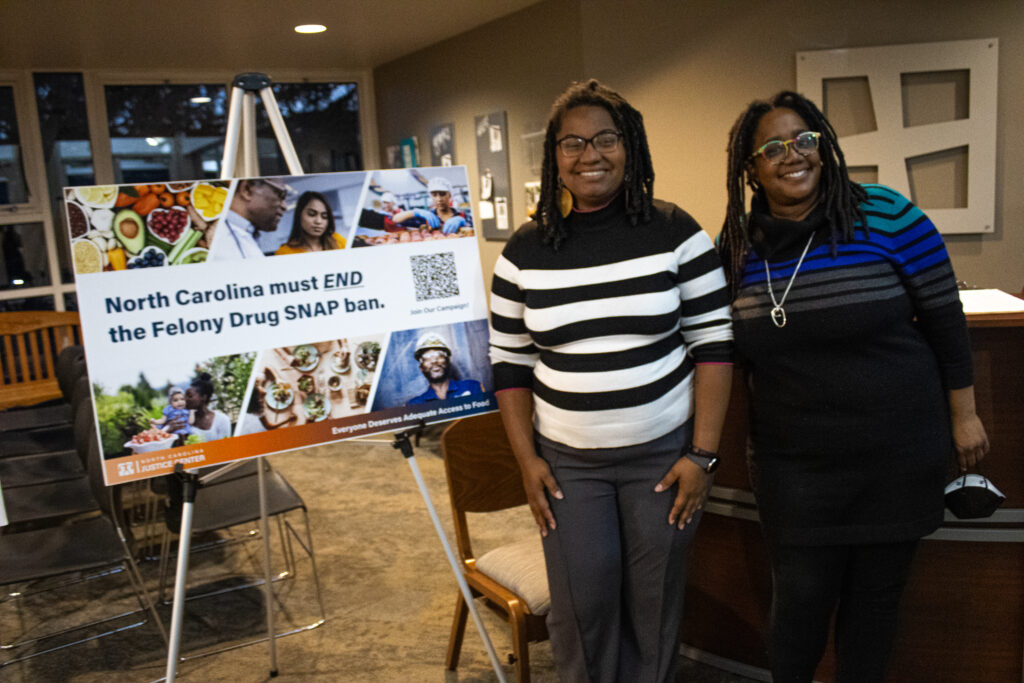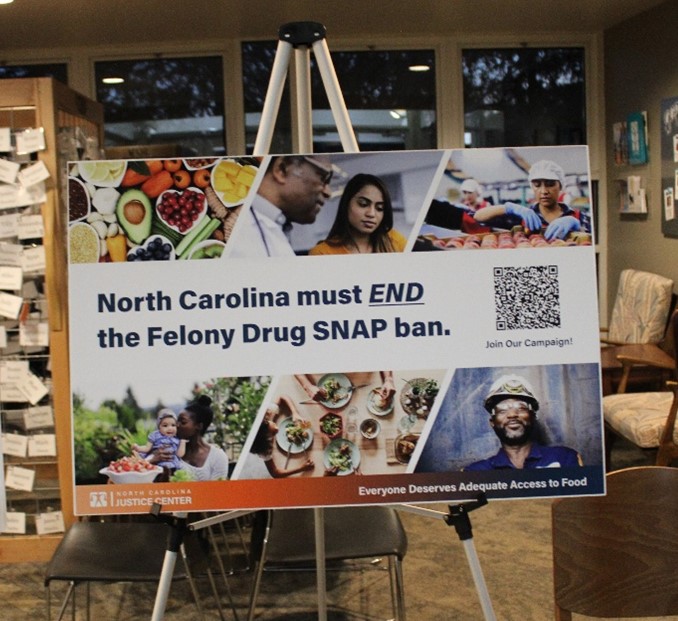On March 27, 2025, the North Carolina Justice Center and Operation Gateway hosted a documentary screening and panel discussion about the felony drug snap ban. The event brought together local advocates, service providers and concerned community members to learn about and discuss the realities faced by tens of thousands of North Carolina residents who are disqualified from SNAP benefits because of a felony drug conviction.
The documentary is a short video that centers and amplifies the experiences of six individuals who face a lifetime ban on SNAP benefits because of a past felony drug conviction.
The panel discussion, which followed the screening, provided information about local and state efforts to overcome the strains on families that are created by the harmful policy. During the panel, Maria Rodriguez, one of the documentary participants, talked about what it meant to her to be excluded from SNAP for the rest of her life and why she decided to participate in the documentary. Jason Turnbull, representing Manna FoodBank based outside of Asheville, NC reminded those present that policies like the Felony Drug SNAP Ban create a significant strain on community resources, “for every SNAP application that’s denied, that’s one more family in the food line.” The other panelists were Ed Treat, Attorney at Pisgah Legal Services; Brent Bailey, Coordinator of the Buncombe County Local Reentry Council; and Laura Webb, Fair Chance Criminal Justice Project Director at NC Justice Center.
View the entire panel discussion here
Why We Hosted the Event
We hosted the event to draw attention to the Felony Drug SNAP ban and the need to change state law to fully opt out of the Ban.
THE SUPPLEMENTAL NUTRITION ASSISTANCE PROGRAM (also known as SNAP or food stamps) was designed to address food insecurity and poor nutrition for families living in poverty. The program provides a stipend for recipients to purchase grocery items, including fresh produce and seeds, at certain retailers.
In 1996, fueled by the war on drugs and criminalization of communities that are majority black, indigenous, and people of color; the federal government passed a law to ban people with a felony drug conviction from receiving food stamps. The federal law enables states to opt out of the ban, which many states have. North Carolina is one of a minority of states that still denies access to food stamps because of a felony drug conviction.
NC law disqualifies people with a Class H or Class I felony drug conviction from food stamps for six months after they are convicted or released from prison. To regain eligibility, they must comply with certain requirements, including drug treatment. People with class a A-G felony drug conviction from NC or another state face a lifetime ban to SNAP benefits.
Now is time for North Carolina to end its Felony Drug SNAP Ban. This law change will be little or no cost to the state and provide substantial benefits including reduced recidivism, better economy, more people working, improved family and children investments, lower poverty and food insecurity rates, and reduced overdose rates.
What is Necessary to Lift the Felony Drug SNAP Ban
To allow people with felony drug convictions to access SNAP benefits, North Carolina law makers must support and pass a bill to “opt” North Carolina out of the federal SNAP ban. There are currently three bills, that if passed, would end the lifetime and six-month disqualifications on access to SNAP benefits.
- Senate Bill 564 Public Safety Through Food Access Act: Under this bi-partisan bill, a person will no longer be barred from SNAP or TANF assistance due to a drug-related felony conviction and will be immediately eligible for food and cash assistance as all as they have completed the required drug treatment program.
- House Bill 682 Public Safety Through Food Access Act: Under this bi-partisan bill, a person will no longer be barred from SNAP or TANF assistance due to a drug-related felony conviction and will be immediately eligible for food and cash assistance as all as they have completed the required drug treatment program.
- House Bill 733 Everyone Eats Act: Under this bill, a person will no longer be barred from SNAP or TANF assistance due to a drug-related felony conviction and will be immediately eligible for food and cash assistance
How to support the Campaign to End the Felony SNAP Ban
- Fill out this Form to Join the Campaign – fill out this sign-up form to stay informed about the campaign or to get more involved.
- Screen the Documentary in your community – Screening the documentary in your community will help increase awareness about the need to end this policy in North Carolina. Use the screening guide to find instructions about screening the film.
- Read this Advocacy Toolkit – use this advocacy toolkit to find more information about the NC felony drug SNAP ban and to obtain a shareable one-pager.
- Spread the Word on Social Media Toolkit – use the sample social media posts and graphics in this toolkit to draw awareness to the issue.

 Justice Circle
Justice Circle 

